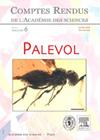晚全新世Imbocco河(意大利中部Portus)的充填:多学科古环境视角
IF 1.3
4区 地球科学
Q3 PALEONTOLOGY
引用次数: 0
摘要
从公元2世纪到公元5世纪,波尔图斯是罗马帝国的主要港口,有一个内部的六角形港口(图拉真盆地)和一个外部港口(克劳狄乌斯盆地),由一条以码头为界的通道连接起来。对该水道提取的岩心进行了地质分析,划分出6种沉积相,主要由典型限制环境的差分类生物碎屑泥、Posidonia oceanica (Linnaeus) Delile, 1813年的堆积和最后的人为充填组成。双壳类、有孔虫类和介形虫类的亚化石记录是地中海咸淡环境(泻湖、河口、三角洲)的特征,由于其物理化学参数的变化和大约300年的周期性航道疏浚,环境压力很大。“海王星球”的存在表明,可能是暴风雨时期的发展,在这个历史悠久的港口内部地区沉积了这些独特的结构。本文章由计算机程序翻译,如有差异,请以英文原文为准。
Late Holocene filling of the Canale di Imbocco (Portus, central Italy): a multidisciplinary palaeoenvironmental perspective
Portus was the main port of imperial Rome from the 2nd century AD to the 5th century AD, with an inner, hexagonal port (Trajan basin) and an outer port (Claudius basin) linked by a channel bounded by quays. Six sedimentary facies have been differentiated in the geological analysis of a core extracted in this channel, basically composed of poorly classified bioclastic muds typical of restricted environments, accumulations of Posidonia oceanica (Linnaeus) Delile, 1813 and a final anthropic fill. The subfossil record of bivalves, foraminifera and ostracods is characteristic of Mediterranean brackish environments (lagoons, estuaries, deltas) with significant environmental stress, due to changes in the physical-chemical parameters and probably the periodic dredging of this seaway during a period of about 300 years. The presence of “Neptune balls” points to the development of probable stormy periods that deposit these unique structures in the internal areas of this historic port.
求助全文
通过发布文献求助,成功后即可免费获取论文全文。
去求助
来源期刊

Comptes Rendus Palevol
地学-古生物学
CiteScore
2.10
自引率
0.00%
发文量
39
审稿时长
17.6 weeks
期刊介绍:
Comptes Rendus Palevol is a fully electronic and peer-reviewed journal, with a continuous publication stream, devoted to palaeontology, prehistory and evolutionary sciences. It publishes original research results, in French or English, in the following domains: systematic and human palaeontology, prehistory, evolutionary biology and macroevolution, and history of sciences. Thematic issues may also be published under the responsibility of a guest editor. All articles published in Comptes Rendus Palevol are compliant with the different nomenclatural codes. A copyright assignment will be signed by the authors before publication.
 求助内容:
求助内容: 应助结果提醒方式:
应助结果提醒方式:


